
Physical activity during pregnancy – how does it affect your health and the baby?
PHYSICAL ACTIVITY IN PREGNANCY HAS A VERY GOOD IMPACT ON YOUR HEALTH AND YOUR CHILD’S HEALTH!
Frequently known topic because I did write it about few times, and now for the second time it’s much closer to my heart 🙂 But before I go into details, it is very important to consult your doctor before taking any physical activity during pregnancy. Regardless of how well you feel, it can sometimes hurt you and your baby. Only a specialist can assess how secure a training is in your particular case and advise on the intensity and type of exercise. It also applies to future mothers who were physically active prior to pregnancy, even08 if running, gymnastics and competitive sports are not foreign to you, never underestimate your doctor’s visit before starting your pregnancy training!
If you have not been very active before, exercise gradually, under the watchful eye of your doctor, and preferably only from the 12th week of pregnancy. If you are not sure what exercises you can perform in each trimester, you can also consult your personal trainer and ask for an individual training program. You can put it together, keeping in mind what you like and what you do not. With your ready workout plan, return to your doctor and confirm that the exercises you have selected are safe for you. If you are all right and you can train, you will be happy to know that you have a great chance of pregnancy without fatigue, easier birth and you will be able to return much faster to form after delivery. Exercise cautiously and calmly, and you will notice the benefits, if you join this training with healthy eating and composing meals, this 9 month period will be really beautiful 🙂
But coming back to training … 🙂
Do not forget that each of us is different and the body’s response to the additional effort during pregnancy may also be different. Watch your body!
Your anatomy and physiology during pregnancy will change and become the key to choosing the right exercise. You will gain weight, your center of gravity will change, and your joints and spine will be heavier. Due to the greater lung ventilation and respiratory volume, the aerobic capacity of those that engage larger muscles in rhythmic movement will be slightly smaller. During training your heart rate should be equal to 140 beats per minute or even lower. To control it, you should train with a heart rate monitor.
I mentioned the benefits of training. Actually there are many, so if there are no contraindications it is worth practicing.
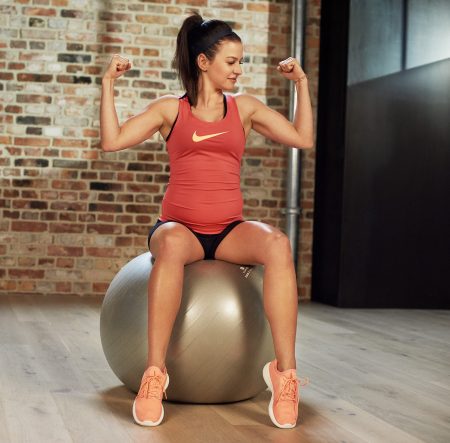
Benefits of physical activity during pregnancy:
- Improve metabolism and lower your weight gain, it will be easier for you to control your weight and avoid obesity.
- You will reduce the risk of developing diabetes
- It will mprove your well-being and you will have plenty of energy each day
- You will sleep peacefully, and waiting for childbirth will not be so stressful
- You will less likely suffer from back pain
- You ease constipation
- You will strengthen the heart
- You will improve your circulatory and respiratory functions, so you will be able to overcome your pregnancy and labor congestion
- The blood flow through the uterus and placenta will increase, which is a positive factor for fetal development and pregnancy.
- You will probably avoid premature labor,longer pregnancy and abnormal placenta
- The birth may be shorter and run more smoothly, because the cervix will progress faster
- Partial cramps will be less painful
- You can count on shorter postnatal hospitalization
- You will strengthen the joints will are more vulnerable to injury by loosening the ligaments
- With better blood supply to your breasts, lactation will start faster and last longer.
- You will reduce the risk of complications during pregnancy, such as preeclampsia
- You will sooner return to physical form and mental balance
If you are still hesitating, I will add that pregnant activity will also help your baby.
What does it mean?
- High probability of high Apgar scores
- Low morbidity and mortality rate
- Better fetal development and pregnancy period due to increased blood flow through the uterus
When you start your pregnancy training, your body awareness will improve and you can watch yourself and your body closely and notice the changes. Make the most of this time taking care of yourself and your body and your Baby 🙂
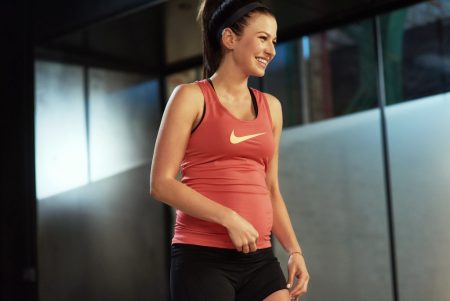
Safety of you and your baby
Safety is the most important element you should focus on while exercising during your pregnancy. I’ve already written about it, and I will probably write more than once, not two;)
Pregnancy is a good time to calm down and focus on yourself. Workouts should include flexible and strengthening exercises, anticoagulation, respiratory, stretching and relaxing exercises. As I wrote above, if you were not active before pregnancy start the training gradually, under the watchful eye of your doctor, and preferably only from the 12th week of pregnancy.
Important safety information during training:
- Be careful during exercise because the blood from the abdomen, also from the uterus, travels to the working muscles and skin, which may threaten the fetal hypoxia.
- The consequence of excessive exercise may increased body heat (hyperthermia). Presumably, an increase in body temperature above 40 degrees may cause fetal damage.
- Excessive effort can cause premature labor by stimulating uterine smooth muscle contractions.
If you do not feel energetic to do full workouts with multiple repetitions, remember that even the simplest exercises bring immediate and future benefits.
Contraindications
I will repeat what I have already written in previous posts, because it is very important: DO NOT TRAIN DURING PREGNANCY, IF YOU HAVE ANY ISSUES LISTED BELOW:
- bleeding
- Cervical carotid insufficiency
- Severe gestational gestose gestures
- hypertension
- diabetes
- Anemia
- Pyelonephritis in pregnancy
- Multiple pregnancy (twin)
- Infections, colds, fever
- Premature births
- Heart disease and lungs of the mother
- Placenta previa after 26 weeks of pregnancy
- Pre-eclampsia
Stop exercising if you experience lower abdominal pain, dizziness and headaches, have shortness of breath, fainting, you feel breathless or its difficult to talk while exercising.
At the end I will add some rules and guidelines, according to which you should proceed Dear future Mother 🙂
Follow these guidelines during exercise:
- Do not start exercising until you get the doctor’s approval!
- To prevent dehydration, during and after workout, take fluids in the right amount. Check your weight after the workout and if it will show that you are lighter than before getting into the exercises, then fill up the fluids
- Exercise clothes should be airy, which can prevent overheating
- Make sure you have the right bra fitting for enlarged breasts
- Do not start intensive training in the first trimester
- Due to the risk of hypoxia, do not dive, do not climb or lift weights.
- Eat complex carbohydrates, which is essential for muscle glycogen recovery
- Exercise should be at the right temperature, and fresh air
- Training will remind you of some muscles, but if you feel pain, stop exercising and consult a doctor.
In addition to the exercises itself:
- Continuous fatigue is a signal that you should reduce the intensity of your workouts
- Maintain a maximum heart rate of 140 beats per minute (you can buy a heart rate monitor to help control it)
- Use exercises that do not threaten injury – especially in the first trimester should be less intense, I recommend walking, swimming or yoga, do not perform exercises on the back, especially from 4-5. month. In some cases, discomfort and dizziness are felt in the very beginning of pregnancy. This is because the enlarged uterus and fetus compress the main lower lumen running along the spine, which can cause fetal hypoxia. In addition, this item is very heavy on the spine. The safest position for training, but also for sleeping is lying on the side, especially on the left
- During exercise do not lift hands above shoulder lines, especially if you use weights
- Deep sitings are not recommended
- Exercises that require touching your toes are not recommended
- Do not perform abdominal muscular strengthening exercises
- Ball gym exercises, lying sideways, supported knees and side support are recommended.
- In advanced pregnancies avoid standing exercises or minimize them – due to the shifted center of gravity and the enlarged belly is much harder to move, so try to relieve the backbone
- Do not use weights in the third trimester or choose the smallest weight, such as 0.5 kilograms, depending on your progress and well-being
- Exercise your back and legs as they help with postural changes during pregnancy. They provide stability and strength and they will prepare the body for effort during childbirth and after childbirth
- Practice yoga and pilates
- Do not jump and do not make violent movements
- Do not practice contact sports like basketball and other team games
- Do at most 3 to 5 workouts per week (everything depends on your well-being)
As I always say: LISTEN TO YOUR BODY!
Your body is the best adviser and will give you the first signal if something is not right. Exercises are not to make you tired, but to strengthen, to move and to relax.
I have developed for you a special training plan “Healthy Mom by Ann” – book and DVD. This is a program that has been prepared based on my many years of coaching experience and knowledge consulted with a group of specialized obstetricians.
I am happy as it is the first such project in Poland, and its under the patronage of the INSTITUTE OF MOTHER AND CHILD.
Dear future Mom! All the material gathered on the disc has been prepared SPECIALLY for you! With care for your health and your baby.



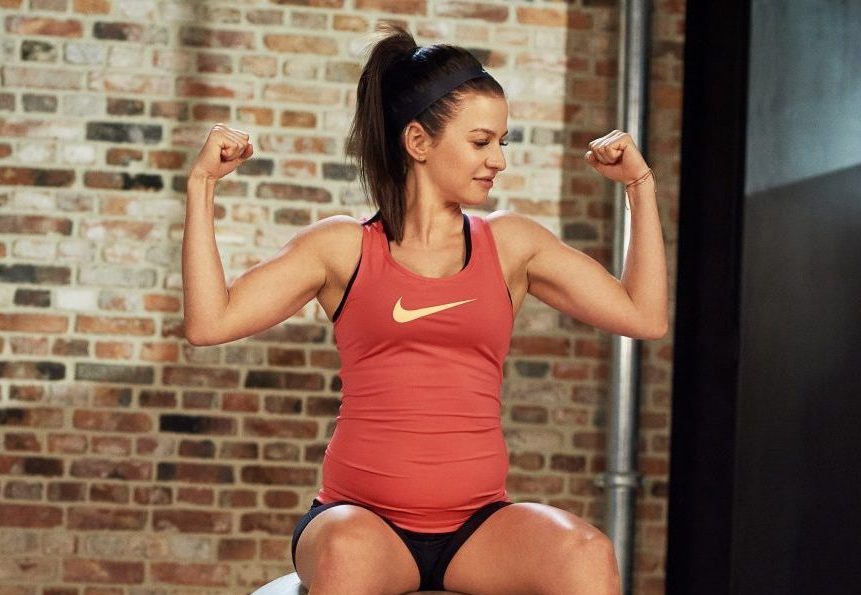
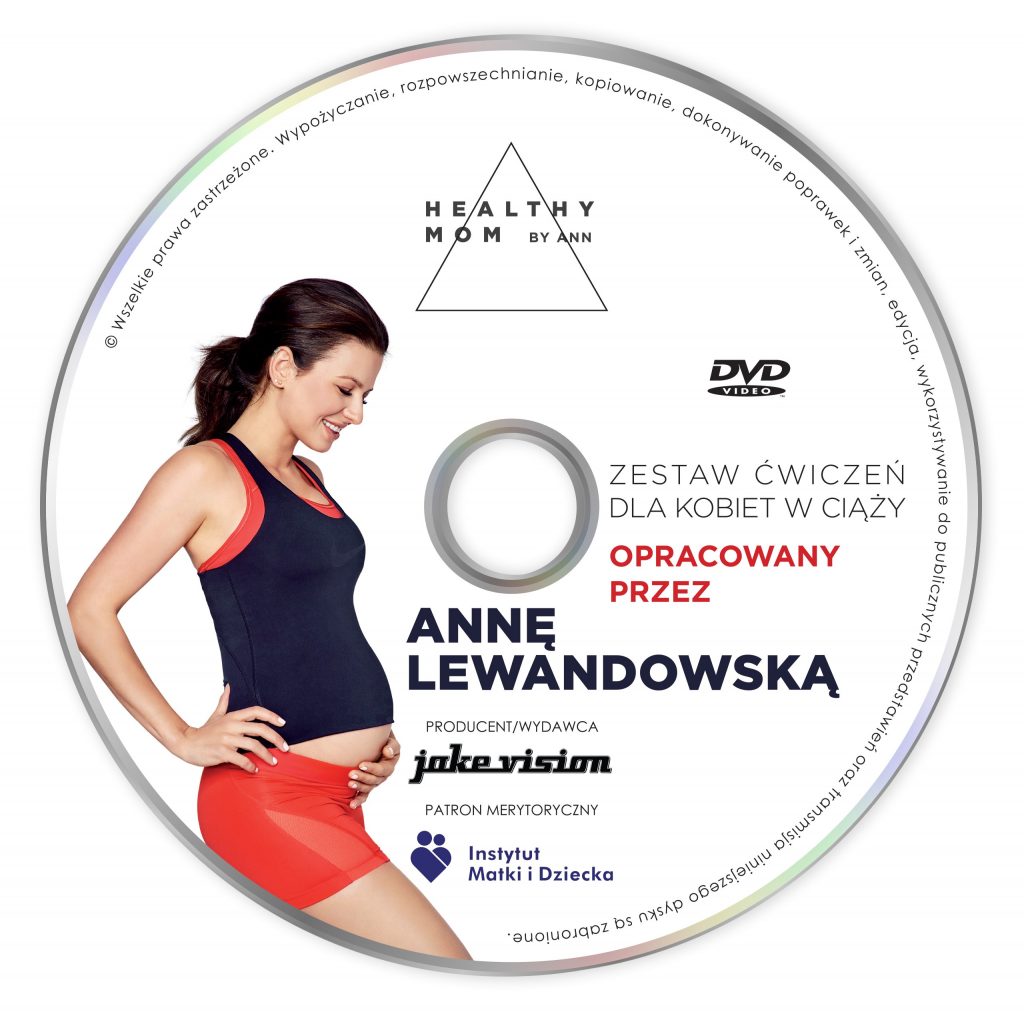
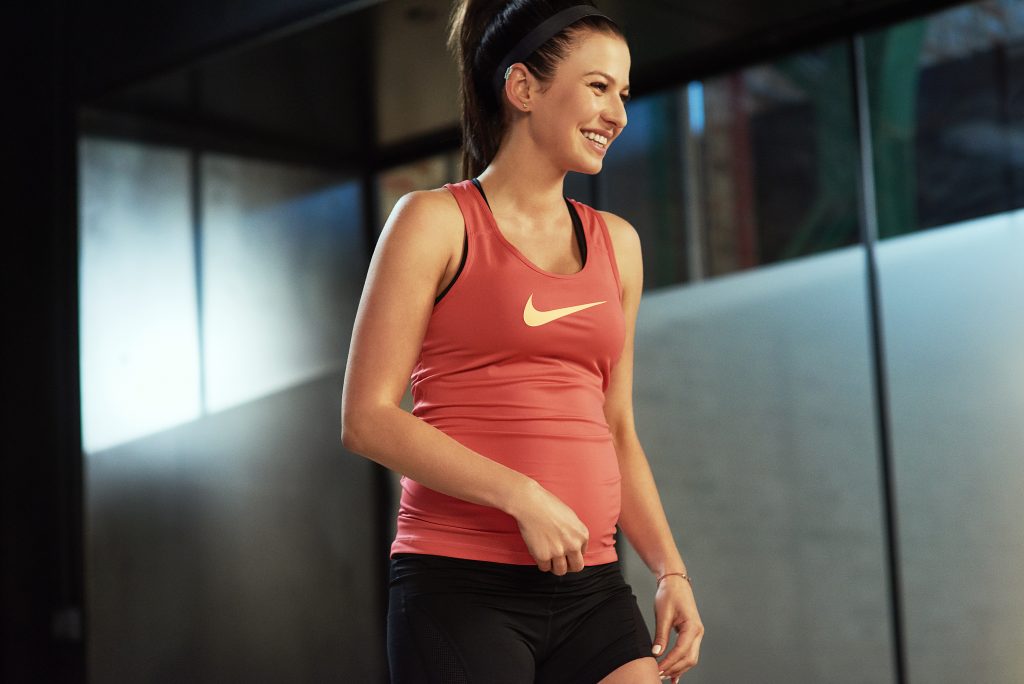





Comments No Comments
Join the discussion…